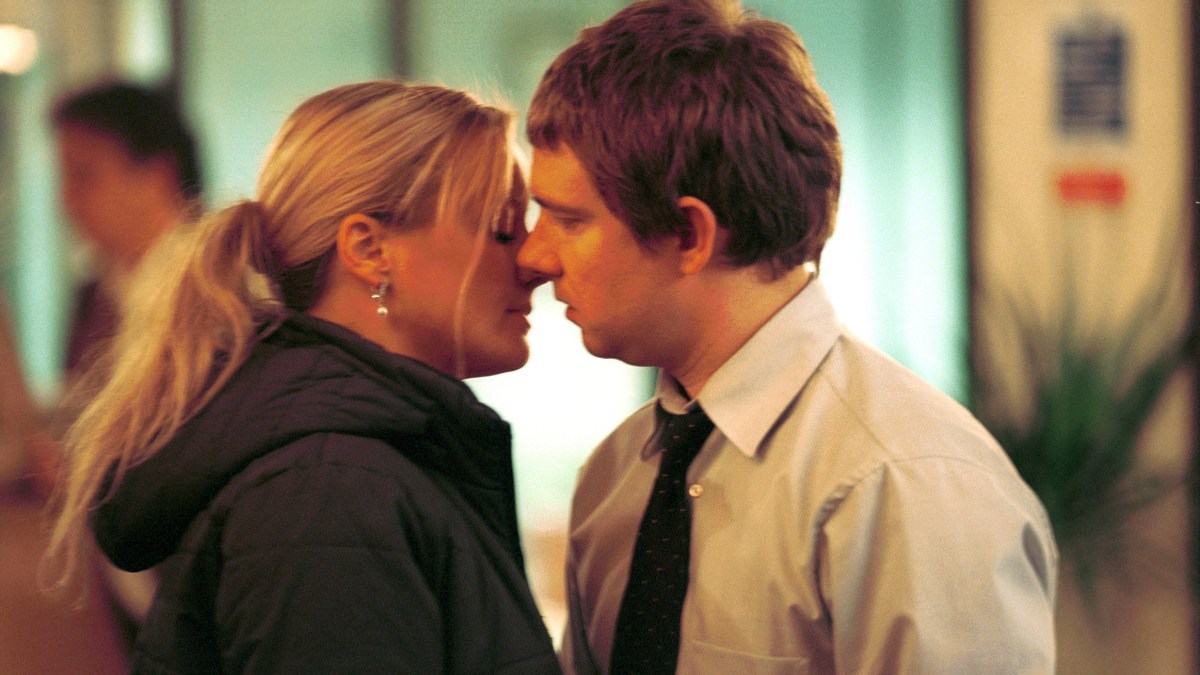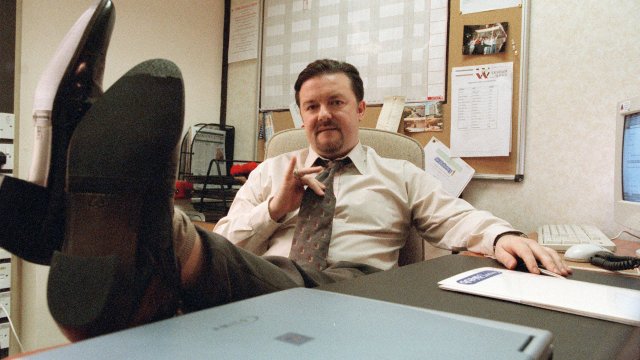It’s getting late at the Wernham Hogg Christmas party. DJ Keith is playing slow jams. The empties are piling up on the desks. Someone has already crashed out on a sofa. In a corner, David Brent, Gareth Keenan and Tim Canterbury are going round in circles over a riddle about a surgeon. Tim has half an ear on Gareth’s theory about triplets, but his heart’s not really in it.
Then, in the gap between Tim and Gareth’s heads, Dawn Tinsley comes into focus and marches across the office, glancing nervously to one side. She reaches Tim, and without a word, she kisses him. “Careful, she’s got a fiancé,” warns Gareth. “Not anymore I haven’t,” says Dawn. They kiss again, and leave the party behind.
The Office, which ran from 2001 to 2003, is one of the most important comedies ever made. It changed British sitcoms; it inspired copycats around the world; it reinvented the mockumentary for the 21st century; it changed how a whole generation spoke to each other. What we don’t remember enough is the influence of the kiss, in those final seconds of its Christmas special finale, 20 years ago, and how it influenced TV comedies to come.
For a very long time – and certainly during the 1990s – British comedies had swerved romance for something brasher, more knockabout or more surreal. Richard Curtis had British romcoms in a headlock, and they tended to stay on the big screen. Sure, in The Vicar of Dibley, he got the endearingly thick Hugo and Alice together, and Neil Morrissey’s Tony pursued Leslie Ash’s Dorothy throughout Men Behaving Badly, but both series treated lovesickness as something very funny. It was just another way of characters losing the run of themselves; part of the joke.
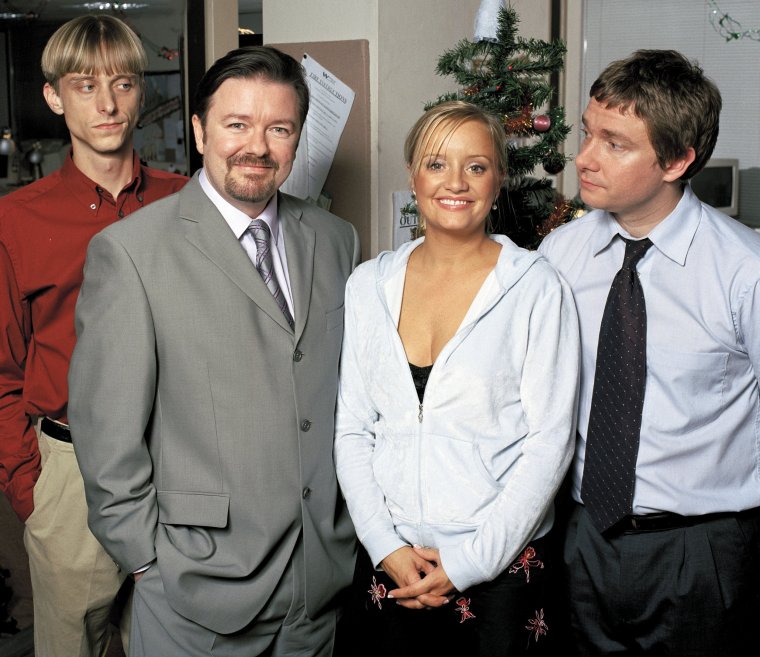
The Office knew that it wasn’t. It treated that tentative, everyday kind of infatuation – the kind built on nothing much more than wasting time together, and two people realising the other is the only other sane person in the building – with a reverence and tenderness that was rare. Every half-sentence left hanging, every quickly reversed admission of how much they meant to each other, every snatched glance across the office as keyboards clacked and computers hummed relentlessly added up to a love story that felt all the more affecting for its mundanity.
That kiss was unsentimental, and beautifully underplayed by Martin Freeman and Lucy Davis, but electrified by a kind of familiar, deep longing. For years, colleagues and best friends Tim and Dawn had been the highlight of each other’s days. In fact, given Tim turned 30 living with his parents without much of a life plan, and Dawn trapped in a loveless engagement with a man she knew she was settling for, they were probably the highlights of each other’s whole lives.
When those spare synths of Yazoo’s “Only You” chimed, and Tim and Dawn kissed at last, The Office played its final ace. It had all been about the sapping tedium of adult life, of compromises made when dreams don’t come true, but at the last, it reminded us that wonderful things happen in the most ordinary places all the time.
After Tim and Dawn, a series-spanning story became part of the architecture of British sitcoms. “That wasn’t traditionally the way you made half-hour comedy,” says Anil Gupta, an exec producer on The Office. “I think Ross and Rachel probably changed people’s thinking on that. And then in the UK, [after] Tim and Dawn, everyone went, ‘yeah, we should all do that’.”
Soon, romance was integral – totally sincerely – and it’s never gone away. Gavin & Stacey had not one but two will-they-won’t-they plots in its first series (with Nessa and Smithy’s bubbling not-quite-chemistry pulling things along even to the end of its own 2019 Christmas special). There was Miranda and Gary in Miranda, John and Kayleigh in Peter Kay’s Car Share, Lee and Lucy in Not Going Out, Kingsley and Josie in Fresh Meat, Al and Sophie in Stath Lets Flats, Aine and Richard in This Way Up, Fleabag and the Hot Priest in Fleabag, and Mark and Sophie and then Dobby in Peep Show. And it’s hard to imagine more recent romcoms like Juice, Starstruck, Feel Good and Smothered being as starry-eyed as they are 20 years ago, if The Office hadn’t found a way to do romance in a manner that felt so true.
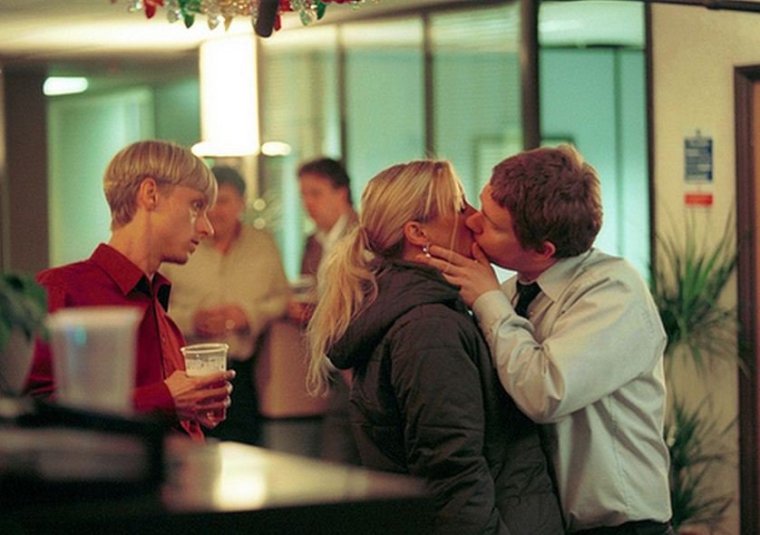
Gervais and Merchant never set out to write a romance plot. Tim and Dawn were the comedy’s “straight men”, the only people at Wernham Hogg who seemed to know that there was a world outside. With their panicked or weary looks to camera – are you seeing this? Can you believe this guy? – they became our eyes and ears on the office floor.
“[Gervais and Merchant] had this very purist idea, almost Seinfeldian,” says Gupta. “‘It’s about a boring office with this dreadful boss and nothing happening and the crushing mundanity of it all.’ And we were like, ‘yeah, great. But we do need a story’.”
Ross and Rachel’s love story in Friends had become a huge pop cultural event. “I remember saying, ‘you know, one of the old classics is a kind of will-they-won’t-they romance type thing. Is there any room for anything like that?’”
They took it on board. By the second draft of the first series’s scripts, Wernham Hogg’s employees were threatened by redundancies and Tim and Dawn were bonding by tormenting Gareth – and for all their self-consciousness in front of the camera, they seemed oblivious to each other’s feelings.
But it always seemed they wouldn’t get it together. Lee, Dawn’s cloddish, unfeeling fiancé – the one who proposed by taking out a pay-by-the-word ad reading “LEE LOVE DAWN. MARRIAGE?” – was crushing her fragile aspiration of being an illustrator, but the only thing more fragile than those was Tim’s confidence after being knocked back by her, twice, and on TV too.
The second (and apparently final) series had ended on a one-two punch of Dawn announcing she was leaving Slough, and Tim yanking off his microphone to take one last big swing and tell her how he felt. Through a cubicle window, we saw him wordlessly crumple. “She said no, by the way,” Tim muttered afterwards at his desk.
Jane Root was Head of BBC Two at the time, and was one of several BBC figures who couldn’t bear for Gervais and Merchant to end The Office there.
“I’d meet them for lunch and be like, ‘Another series, you could do another series,’ and they’d go ‘hmmm, we’re not sure’,” Root says. “We’d order another bottle of wine, we’d have dessert, and I’d be like ‘Think about it guys, it could be so great.’ And then I’d get in a taxi and go back to the office and they’d send me an email and say, ‘No, we’re not gonna do it’. And then I’d take them out another two months later.”
Eventually, after much lobbying, they agreed, and the Christmas specials were announced, set a little over a year after we left the former employees of Wernham Hogg.
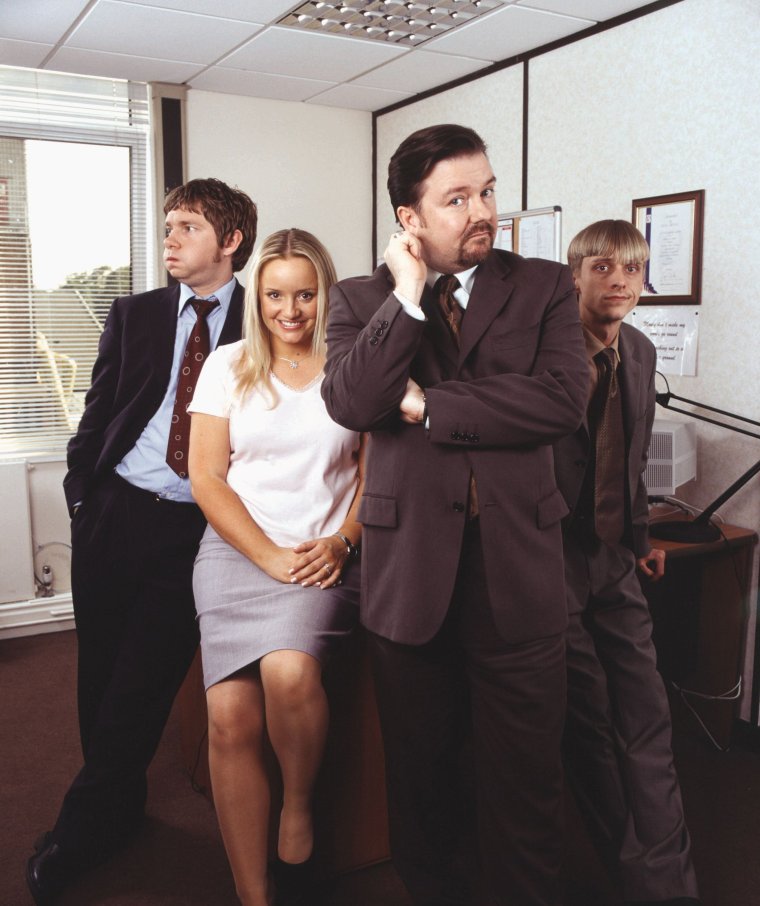
The story switched away from the sacked Brent’s search for fame or Gareth’s running the office as a military junta, and towards Tim and Dawn, reunited on her brief trip back from America and with just the same spark. “I think we always wanted a happy ending for Tim and Dawn,” Merchant told the Telegraph recently. “But we felt when they got together that would be in the end.”
“It was all about that story, wasn’t it, really?” remembers The Office’s cinematographer Andy Hollis. “That was the crux of the Christmas specials: do they get together?” Hollis found out first-hand exactly how intense the public’s speculation was when a script addressed to him ended up in the letterbox of a neighbour, who promptly sold it to the Daily Mail. The paper revealed chunks of the Christmas special’s plot before broadcast, but not Tim and Dawn’s kiss.
“That was awkward,” says Hollis now. He still sees the neighbour responsible around town, and is still annoyed about it. “Even though it wasn’t my fault, I could feel people staring at me [on set], as if I’d managed to let it happen.”
The Office’s two-part finale looked as if it would leave its characters on a sad note. By day, David Brent was selling chamois leathers and cleaning products to hotels off the M25; by night he was doing increasingly tragic personal appearances in nightclubs to punters who despised him.
Desperate to keep up with his nemesis Neil and awful friend Finchy –bloody good rep – Brent was searching for a date to the Wernham Hogg Christmas party. Dawn and Lee returned to Slough, courtesy of the documentary makers, and Tim and Dawn reunited to tease Gareth. But it seemed like a reminder of what they could have had – making their inevitable separation all the more painful.
The night after it was broadcast, Merchant overheard a few guys at the pool table in a Bristol pub complaining about how bleak the ending had been, unaware there was a second part to come.
When it did, the heartstrings were tugged harder. Brent was banned from the office; Lee continued to trample over Dawn’s artistic hopes. When Lee announced they’d be leaving the Christmas party early, and she followed, the dejected Tim said a final goodbye: “Have a nice life”. Then, in the back of the taxi, Dawn unwrapped Tim’s secret Santa gift: a set of paints, and the message “Never give up”.
No matter how many times you see that kiss, it’s an air-punch moment. It’s the perfect happy ending to a near-perfect story. “In a movie, the camera would do a 360 around them and the strings would be swelling,” Merchant recently told GQ. “For us, it felt almost too much to be seeing it at all. It felt so private.” If it felt like we were snooping on the most important moment in these people’s lives, well, that was deliberate. Hollis remembers shooting on a long lens. “It felt like we were sneaking a peek, just catching it, you know – not right in there with them.”
Picking the right soundtrack to the kiss was the final touch. “We didn’t know if we’d nailed it right away, but when we were cutting it together later, we knew,” Merchant said. “Once we put ‘Only You’ by Yazoo on it we thought: ‘if this doesn’t get them, nothing will’.”
The Office was all about ordinariness, and the way it can sand away at your sense of self. But Tim and Dawn had at least one thing there that was real and meaningful. They reminded us that we could find meaning in mundane, unexpected places, too. “It’s the understatedness of it all which is so lovely,” says Gupta. “Those little sideways looks and glances resonated with people. Everyone who’s ever had that unrequited office crush thought, ‘Yeah, I’ve been there’.”
